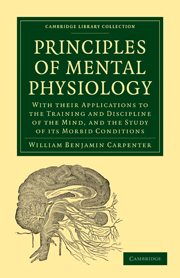 Principles of Mental Physiology
Principles of Mental Physiology Published online by Cambridge University Press: 29 August 2010
273. There is no part of Man's composite nature, in which the intimate relation between Mind and Body is more obvious, than it is in the formation of habitual modes of activity, whether Psychical or Corporeal; the former, like the latter, being entirely conformable to the Laws which express the ordinary course of the Nutritive operations. A general knowledge of these Laws being therefore essential to the student of Mental Physiology, a concise statement of them will be here given.
274. In the first place, it is characteristic of every living Organism to build itself up according to a certain inherited type or pattern; so that we must attribute to its germ a “formative capacity,” in virtue of which it turns to account both the food and the force which it derives from without, —like the Architect who directs the construction of an edifice, which is raised out of the materials brought together by one set of workmen, by means of the labour furnished by another. But this constructive process may undergo considerable modification under the influence of external conditions; so that the reproduction of the parental model is attended with more or less of variation. This influence is peculiarly manifested in the lower types both of Animal and Vegetable life; many of which display a remarkable polymorphism. Thus the germs of the simpler Fungi, falling upon different kinds of decomposing matter, will develop themselves into forms that differ so strikingly from each other, as to have been accounted not only specifically but generically distinct.
To save this book to your Kindle, first ensure no-reply@cambridge.org is added to your Approved Personal Document E-mail List under your Personal Document Settings on the Manage Your Content and Devices page of your Amazon account. Then enter the ‘name’ part of your Kindle email address below. Find out more about saving to your Kindle.
Note you can select to save to either the @free.kindle.com or @kindle.com variations. ‘@free.kindle.com’ emails are free but can only be saved to your device when it is connected to wi-fi. ‘@kindle.com’ emails can be delivered even when you are not connected to wi-fi, but note that service fees apply.
Find out more about the Kindle Personal Document Service.
To save content items to your account, please confirm that you agree to abide by our usage policies. If this is the first time you use this feature, you will be asked to authorise Cambridge Core to connect with your account. Find out more about saving content to Dropbox.
To save content items to your account, please confirm that you agree to abide by our usage policies. If this is the first time you use this feature, you will be asked to authorise Cambridge Core to connect with your account. Find out more about saving content to Google Drive.